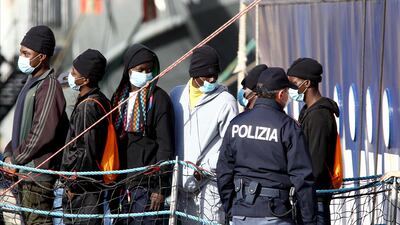Charities rescuing migrants off the coast of Italy have condemned the government’s tough new anti-immigration rules, and warned the changes could lead to thousands of avoidable deaths.
One group involved in rescue missions said Prime Minister Giorgia Meloni’s new policy “is likely to be unlawful”.
The first woman to hold the position, she won September’s election on a promise to curb illegal immigration, and her administration is wasting no time in clamping down on the practice.
International aid groups who pluck migrants from the Mediterranean Sea and transport them to Italy are facing roadblocks in their humanitarian mission.
Ms Meloni’s Cabinet this week approved a new policy, under which ships rescuing migrants should request a port and sail to it “without delay” after rescuing people, rather than remain at sea searching for other migrant boats in need of assistance.
It is common for non-governmental organisations and charities to have vessels at sea for several days at a time, and pick up hundreds of people before heading to dry land.
Ship captains risk fines of €50,000 and having their vessels seized by authorities if they break the rule.
Sea-Eye, a German NGO that rescues and provides assistance to migrants in the Mediterranean, accused the Italian government of trying to “further complicate” its work and said the new rule “massively interferes with the rights of the flag state Germany, European law and international and regional human rights guarantees.”
Prof Valentin Schatz, a member of the Sea-Eye legal team, said after he and his colleagues conducted a preliminary assessment of the decree they concluded that “it is likely to be unlawful insofar as it seeks to regulate the conduct of German-flagged vessels in international waters and to sanction them upon entry into the Italian territorial sea.”
“The coastal state has no authority to regulate and enforce the rescue of foreign ships beyond its territorial sea [12 nautical miles],” he added. “Thus, Italy cannot dictate how rescue operations in international waters are to be conducted, as this is a matter for the flag state [in the case of Sea-Eye Germany].”
Dr Annika Fischer said she and her Sea-Eye colleagues “expect the Federal Government to protect the sea rescue organisations under German flag from the illegal behaviour of the Italian authorities and to support us decisively in case of conflict.”
She warned “any delay in our operations endangers human lives”.
A document from the office of Italy’s interior minister Matteo Piantedosi said the country has welcomed more than 103,000 migrants since the start of 2022, up 55 per cent over last year.
It said only one in 10 people who arrived in Italy in 2022 were brought ashore by NGO boats.
However, it also noted how rescue boats acted as a "pull factor" for those making the perilous voyage across the Mediterranean from Libya.
NGOs argue that their presence in the sea does not encourage migrants to risk.
Doctors Without Borders, which has for years maintained a presence in the Med, is preparing to launch a rescue mission in the coming days. Juan Matias Gil, who heads the group’s mission for search and rescue, hit out at the Meloni administration.
“The objective of the government strategy is to obstruct the NGOs’ search and rescue activities and [it] will exponentially increase the risks of thousands of people dying,” he said.
In a tweet, the group said: “With the new rules imposed by the Italian government on NGO boats, we will be forced to leave rescue zones uncovered with the inevitable increase in the number of deaths.”
The UN migration agency said nearly 1,400 people have died or are missing and presumed dead in trying to cross the Med this year.


